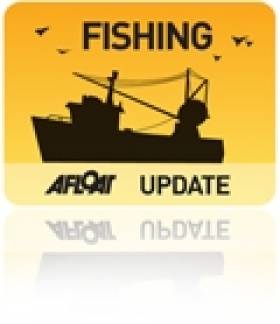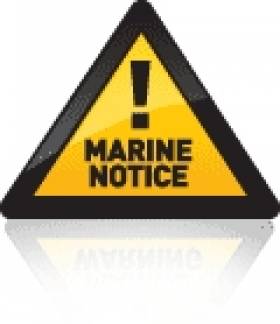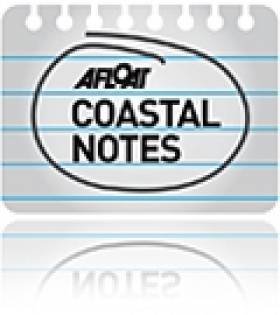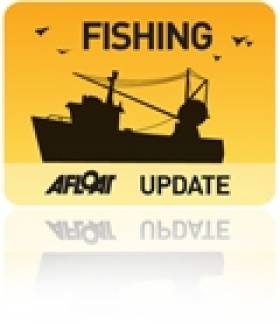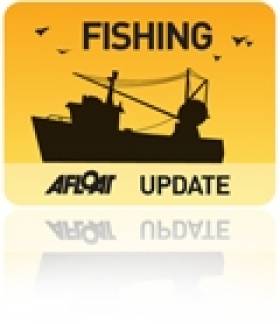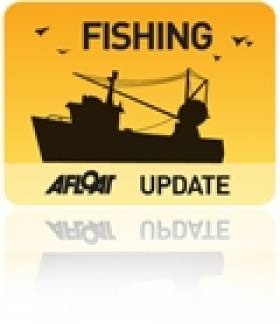Displaying items by tag: Fishing
New System of Points for Serious Fisheries Offences
#fishing – Ireland now has in place a system to apply points to the license of fishing vessels involved in serious fishery offences. Irish legislation, bringing into effect Ireland's points system for serious infringements of the Common Fisheries Policy (CFP), as required by EU regulation, was signed into law by Simon Coveney, TD, Minister for Agriculture, Food & the Marine on the 8th January 2014. The point's scheme is separate from other potential sanctions for serious infringements including, for example, a court prosecution.
Infringements which might be regarded as warranting points when they are sufficiently serious, would include:
failing to fulfil obligations to record and report catch or catch related data (including data to be transmitted by satellite vessel monitoring system);
use of prohibited or non-compliant gear;
falsification or concealing of markings, identity or registration of the vessel;
concealing, tampering or disposal of evidence relating to an investigation;
taking onboard, transhipping or landing of undersized fish;
carrying out of fishing activities in a prohibited conservation area;
fishing without a valid licence, authorisation or permit issued by the flag State or the relevant coastal State;
fishing in a closed area or during a closed season, without or after attainment of a quota or beyond a closed depth;
fishing for a stock which is subject to a moratorium or for which fishing is prohibited and,
obstruction of the work of officials in the exercise of their duties in inspecting for compliance with the applicable conservation and management measures.
The number of points to be attributed for specific infringements is set down in EU regulation. Every time a serious infringement is committed, the appropriate number of points will be assigned to the license holder of the vessel. Any license holder who accumulates more than 18 points will have the fishing license suspended for at least two months. For higher numbers of points the penalty increases to suspensions of four, eight and twelve months respectively. If, after the end of the fourth suspension period, further serious infringements occur, the fishing license will be permanently withdrawn. However, if the offender does not commit any serious infringements within three years of the previous such infringement, all points on the fishing license will be deleted and he/ she will start again with a clean slate. The regulation also provides for fishers to engage in activities which would result in deletion of points. Points stay with the vessel capacity and its associated license and are therefore transferred to the new owner if the vessel is sold on.
Susan Steele, Chair of the SFPA said: 'The SFPA welcomes the point system for serious infringements. The SFPA can initiate the issuing of points to vessels committing serious infringements in waters under Irish Jurisdiction and this will go a long way to ensure that fishing rules are applied in the same way in all member countries as well as harmonising the way infringements are sanctioned. We believe in proportionate dissuasive sanctioning of infringements detected and the SFPA are committed to implementing this system in an effective, fair and proportionate manner. These rules will give Ireland and other EU Member States new powerful tools not only to protect our fishing resources from unscrupulous operators, but also to protect the livelihoods of honest fishermen who would otherwise be exposed to unfair competition.
'The point system for serious infringements will work in tandem with the legal prosecution process through the courts. The cumulative effect should provide a very real deterrent for those who seek to gain unfair advantage over their fellow fishers by engaging in repeated serious infringements.'
Small Fishing Vessel Revised Safety Code Published
#fishing – Minister for Transport, Tourism & Sport Leo Varadkar has welcomed the publication by the Irish Maritime Administration in his Department of a revised Code of Practice for the Design, Construction, Equipment and Operation of Small Fishing Vessels (less than 15 metres length).
The Code, which was last revised in 2005, has been updated to ensure that the experiences gained from its implementation as well as relevant recommendations by the Marine Casualty Investigation Board (MCIB) have been incorporated. The revised Code will come into operation from 3rd March 2014.
Small fishing vessels are already required to carry EPIRBs (Emergency Position-Indicating Radio Beacons). The revised Code requires them to carry automatic, float-free EPIRBs, and for everyone on board such fishing vessels to wear Personal Locator Beacons (PLBs).
These changes to the Code follow several reports from the MCIB recommending the use of float-free EPIRBS on fishing vessels and the wearing of PLBs by all on board. Float-free EPIRBS are now much smaller and cheaper than earlier models.
Every fishing vessel will be required to be in compliance with these new requirements when they are next surveyed. This is in line with the safety initiative for the Irish Fishing Industry launched in Union Hall in July 2013 by Minister Varadkar and his colleague, Minister for Agriculture, Food and the Marine Simon Coveney. At the same event both Ministers also announced a new, enhanced Safety Equipment Grant Aid Scheme by Bord Iascaigh Mhara.
"While safety equipment may prove valuable in accelerating response times when a vessel or crew member gets into difficulty, it is no substitute for the overriding 'safety-first' approach which has to be recognised and adopted by everyone in the fishing sector if we are to see a reduction in the number of incidents, injuries and loss of life in the sector. I also remind all skippers and fishermen of their responsibility to check on all of their safety equipment prior to each trip to ensure it is all on board and in working condition," Minister Varadkar said.
The revised Code also includes details on existing requirements for the regular carrying out of musters and drills to ensure skippers and crew are familiar with safety procedures should an incident occur.
"Our laws, regulations and codes of practice already reflect best international practice, and there is no compelling reason why, one day, there should be no fatalities in the Irish fishing sector. We need a change in attitude, culture and practice across the sector."
Marine Notice: Revision Of Code Of Practice For Small Fishing Vessels
#MarineNotice - Marine Notice 14 of 2014 advises that a revised Code of Practice concerning the Design, Construction, Equipment and Operation of Small Fishing Vessels of less than 15 metres length overall (Revision 2 dated 20/01/14 with operative date of 03/03/14) has been published.
The revision incorporates provisions relating to the carriage of automatic, float-free EPIRBs for fishing vessels of under 12 metres and for the wearing of Personal Locator Beacons by all on board a fishing vessel (Chapter 9.5). Training is also required on the use of this equipment (Chapter 8).
These requirements will be included in the scope of the initial survey, survey renewals and at intermediate declaration stage. There are other textual changes reflecting feedback from the industry, surveyors and findings of the Marine Casualty Investigation Board. These include:
- The title of the code has been updated to reflect the inclusion of operational matters;
- Stability criteria remain essentially the same but ‘roll tests’ now need to be carried out both in ‘departure’ and ‘arrive port’ conditions (Chapter 3.2);
- Existing requirements in relation to drills/musters (Chapter 8.9) and the regulation of work/rest time (Chapter 8.10) have been included in the Code;
- Text has been included to remind fishers of their existing obligations to comply with passage planning requirements (Chapter 10.14);
- The Declaration form (Annex 8) has been updated and clarified so as owners and panel surveyors are clear of their obligations under the Code;
- and References to bodies and Marine Notices, etc have been updated.
A copy of the revised Code of Practice is available on the Department’s website HERE. The most recent listing of the approved panel of surveyors and their contact details is also available via the previous link.
Minister Pushing For Assistance For Storm-Affected Galway Fishermen
#Fishing - Marine Minister Simon Coveney has said he will do what he can to help fishermen in Galway whose livelihoods have been affected by the damage wrought in the recent storms, as Galway Bay FM reports.
The move follows a call by a local senator for Government assistance to inshore fishermen facing expensive repairs to vessels and docksides, not to mention many small shellfish farms devastated by the extreme waves and high tides.
In other regional news, the Connacht Angling Council says it will oppose the introduction of compulsory angling charges should they be introduced with the new Inland Fisheries Bill.
According to the Galway Advertiser, opponents of the bill view any proposal for a registration charge as a 'rod licence' in disguise.
"The ownership and right to use these waters for angling are jewels that we have inherited from our forefathers," said council chair Martin Kinneavy, "jewels our forefathers fought to keep and are not for sale at any cost."
Afloat.ie recently published an FAQ on proposed measures for the new bill.
Erosion And Harmful Fishing Pose Double Threat To Ireland's Coastline
#Coasts - Increasing coastal erosion and weathering will soon force Ireland to make hard decisions about what parts of the coastline are too expensive to protect, according to a university professor.
As The Irish Times reports, Prof Robert Devoy of University College Cork says that with erosion rates threatening to jump far beyond the current average of up to 1 metre a year, Ireland's coastal counties would have to look "very clinically" at what parts are most worth concentrating their engineering efforts - expensive measures that simply cannot be afforded for all coastal areas.
The senior lecturer in the UCC Department of Geography says: "We need to assess which bits of the coast are most vulnerable to flooding and erosion and which bits of coast from a heritage viewpoint are important to retain and protect."
This sobering warning comes after Lorna Siggins' commentary on the state of Ireland's coastal marine environment, as six new marine protected areas are set to be enacted in law.
The six sites around the coast earmarked for designation as Special Areas of Conservation were proposed by Heritage Minister Jimmy Deenihan more than a year ago
But as Siggins states: "There’s turbulence ahead, if the State’s approach to fulfilling the habitats directive on land is anything to go by."
Aside from the "inconsistencies, poor communication and lack of stakeholder engagement" of the likes that have undermined bog conservation efforts, there's also the "survival of the fittest" attitude among the fishing fleet engendered by uneven implementation of the Common Fisheries Policy to contend with.
And according to Siggins, even the reformed CFP spearheaded by Marine Minister Simon Coveney will do "little to protect sensitive spawning grounds".
The Irish Times has much more on the story HERE.
Fisherman Affected By Storms Need Govt Assistance Says Senator
#Fishing - A Galway senator has called for Government assistance for inshore fishermen devastated by the recent storms that have ravaged the west coast, damaging vessels, piers and slipways - and devastating many small coastal shellfish farms.
As Galway Bay FM reports, Senator Trevor O' Clochartaigh (Sinn Féin) has suggested Marine Minister Simon Coveney could bail out via an emergency fund fishermen whose livelihoods have been threatened.
Similar funding has been called for to help repair coastal roads in Galway rendered impassable by the exceptional winds and flooding since the New Year began.
In addition, Galway West TD Eamon O Cuiv says he will press the Government to make funds available for the Aran Islands and the Connemara region, both of which have been severely affected by the worst storms in recent memory.
The nation was this week left counting the cost of the extraordinary series of storms, in particular Lahinch in Co Clare, which suffered millions of euro worth of damage to its seaside promenade as massive swells encroached half a kilometre inland.
Six lighthouses also sustained structural damage in what were often hurricane-force winds, though all remained operational.
Severe Weather Prevents Coastguard Medevac From Spanish Fishing Boat
#Coastguard - TheJournal.ie reports that yesterday's severe storm conditions forced two Irish Coast Guard helicopters to stand down a mission to retrieve an ill fisherman from a Spanish trawler 100 miles off the west coast last night (27 December).
A coastguard spokesperson has since confirmed that the fishing vessel later arrived near Castletownbere in West Cork where the crewman casualty, who complained of chest pains, was being assessed.
Quota Cuts 'Threaten Jobs' In Irish Fishing Industry
#Fishing - Marine Minister Simon Coveney has defended a deal reached in Brussels that will see a reduction in Ireland's quotas for prawn and haddock, which some argue will cost the economy many millions of euros.
As The Irish Times reports, the Federation of Irish Fishermen (FIF) says as many as 350 jobs could be lost following the EU Fisheries Council's agreement to cut the Irish prawn quota by 9% and the haddock quota by a third - a move FIF's chair Francis O'Donnell described as "a charter for discards".
O'Donnell says that the cuts to two of Ireland's most valuable catches, plus similar reductions for cod and whiting, will mean an 8% overall income loss for the Irish fishing fleet - despite significant and welcome quota increases for hake (49%), megrim in the north-west (20%) and monkfish in the south-west (15%).
Defending the deal, Minister Coveney says people "need to look at the whole package", emphasising that the "overall value of fishing opportunities" is the same as last year, at a value of €250,000, which in his view "can keep the fishing fleet intact, and commercially viable".
The Irish Times has much more on the story HERE.
Marine Minister Warns Of 'Exceptionally Tough' EU Fisheries Negotiations
#Fishing - Marine Minister Simon Coveney is attending the EU Fisheries Council in Brussels from today (16) till Wednesday 18 December, where quotas for the Irish fishing fleet for 2014 will be determined.
According to the minister's department, the proposals put forward from the European Commission impact the Irish white fish sector with severe cuts in many stocks of vital importance to Ireland.
This year’s negotiations will also be heavily impacted by the lack of progress on the annual talks on fisheries opportunities for 2014 between the EU and Norway and between the EU, Norway, the Faroe Islands and Iceland.
This lack of progress means that the council will only be able to discuss provisional quotas for mackerel, blue whiting and Atlanto-Scandic herring for 2014.
Minister Coveney said: “I have considered the scientific advice available on fish stocks carefully. In some cases the advice is firm and it is clear that quota reductions will be required. However, I am not convinced that the proposed level of cuts is justified in certain cases.
"The total financial impact of the proposed cuts would, according to Bord Iascaigh Mhara (BIM), amount to over €70 million. I accept that some reductions are inevitable to protect the health of stocks, but I also believe that the commission’s interpretation of the scientific advice in some cases is excessively precautionary and will only result in increased discarding of fish at sea.
"I do not wish to see the council taking decisions which could result in an increase in quota driven discards. In such cases, I will be making a strong case for a more reasonable approach to the available advice, especially in mixed fisheries.”
The minister went on to highlight some of the proposals where he is especially concerned about the potential negative effect on incomes in Ireland's coastal communities.
“The commission is proposing a 24% cut in the hugely important prawn fishery. I do not consider that this proposal is justified and I am working with my UK colleagues to convince the commission to adjust its approach," he said.
"In the Celtic Sea, I am extremely concerned about the proposals to cut Haddock by 75%, cod by 33%, whiting by -22%, megrim by -20% and sole by 20%.
"Other proposed cuts in stocks of particular concern include pollack (-20%), haddock and cod in the Irish Sea (-20%) and sole in the Irish Sea (-33%) as well as horse mackerel (-40%) and monkfish in the North West (-20%).”
On the matter of the international negotiations on certain fish stocks of importance to Ireland, Minister Coveney said: “The failure to make progress on the EU/Norway negotiations has compounded the stalemate in the Coastal States negotiations on mackerel, blue whiting and Atlanto-Scandic herring. I am supporting an overall balanced agreement on these very important stocks.
"I do not support the current commission proposal, granting Iceland and the Faroes an excessive share of the mackerel stock, which is of such vital importance to Ireland. Mackerel is our single most valuable fishery and I will again be insisting that the commission work closely with Norway on securing a fair and proportionate sharing agreement.”
Concluding his remarks in advance of the council, Minister Coveney said: “Every December Fisheries Council is difficult, but I think that this year’s could be one of the most difficult for some time and we should not underestimate the immense challenges facing us in trying to obtain a fair and rational, biologically and economically sustainable outcome for Ireland.
"I have worked closely with industry and other stakeholders to prepare for these extremely tough negotiations and will continue to do so in the challenging days and nights ahead. There will be cuts to some quotas important to Ireland, in the white fish sector, but there will also be some positive news, particularly for some pelagic species.
"I will be devoting all my efforts to reducing the scale of those cuts, taking account of the scientific advice. I will work with other member states such as the UK and France and with the European Commission to try to achieve an acceptable outcome.”
Fishing Dispute Grounds Wexford Trawler Crews
#Fishing - The crews of 15 fishing vessels in Wexford operated by the O'Flaherty brothers have been temporarily laid off in a dispute over regulations, as RTÉ News reports.
It's emerged that the Sea-Fisheries Protection Authority last week issued orders for all 15 boats in the O'Flaherty fishing fleet to cease operations immediately, days after two boats were recently questioned over alleged infractions of fishing regulations.
The Department of Agriculture and the Marine has not commented on the reasons for issuing cessation orders to the O'Flahertys.
Seamus O'Flaherty - one of four brothers who operate the Kilmore Quay-based fleet - was in the news this time last year when he gave away free monkfish to the public on the quayside after exceeding the EU quota with his catch.
Jimmy Byrne, skipper of the O'Flaherty-owned Saltees Quest, defended the display as a protest against the EU mandate to discard all over-quota fish at sea - a practice that is hoped will come to an end with the new Common Fisheries Policy.


























